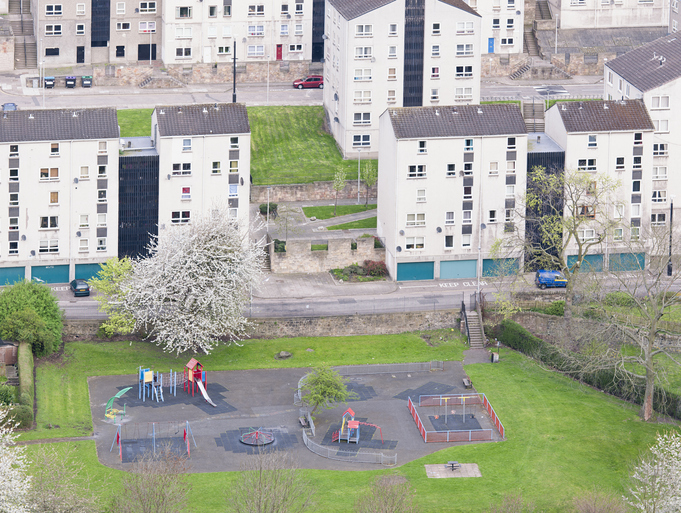Dr Kim McKee, Head of Housing, Faculty of Social Sciences, University of Stirling
Dr Sharon Leahy, School of Geography & Sustainable Development, University of St Andrews
Anna Pearce, MRes student, University of St Andrews

A local playground in a housing development in Edinburgh, Scotland.
Emerging evidence highlights that the social and economic impacts of coronavirus do not fall equally. Black, Asian, minority ethnic and refugee (BAMER) communities have been hit hard, with coronavirus intensifying their housing stress. Evidence shows BAMER households are more likely to live in overcrowded, inadequate housing, within our most disadvantaged communities. They are also less likely to own their home, and more likely to be private renting than white households.
This legacy of racial inequality has profound impacts. Overcrowded accommodation makes it harder to practice safe social distancing at home, whilst higher rates of multi-generational living pose questions about how to safely ‘shield’ the vulnerable when space is limited. This is more acute given that BAMER groups have higher incidences of certain health conditions that leave them at greater risk of the virus – such as heart disease. There is also a lack of translated and widely disseminated advice related to COVID-19 and NHS accessibility for migrant, refugee and asylum-seeking communities. These communities also continue to suffer from the Home Office’s refusal to lift NHS health surcharges. Though there has been a concession that there is no fee for the testing and diagnosis of COVID-19, the fear of ineligibility is likely to prevent people from accessing treatment who need it. Indeed, recent analysis by the IFS highlighted that the number of deaths from COVID-19 is disproportionate amongst minority groups.
There are clear interconnections here between health, housing and inequality in the context of COVID-19. BAMER groups are amongst the poorest households in the UK. They are also more likely to experience precarious, low-paid employment than the white population. The government safety net, even after the recent coronavirus job protection measures, is insufficient to protect these groups. Migrants and refugees with ‘No Recourse to Public Funds’ conditions on their immigration status have access to furlough schemes if they are unemployed, but blanket restrictions on access to mainstream social security benefits remain. Even for those BAMER households who are eligible, levels of Local Housing Allowance (in the private rented sector) remain well below average rents, whilst the five-week wait for Universal Credit compounds households’ financial stress. The failure to fully support the jobs and incomes of the self-employed again disproportionately impacts BAMER groups due to the higher levels of self-employment amongst Pakistani, Bangladeshi and Chinese communities.
Greater reliance on private rented accommodation, in turn, leaves BAMER households vulnerable to the affordability pressures of renting, with knock-on impacts for their tenancy security. Whilst measures are in place to prevent evictions in the short-term, this may simply be storing up arrears, debt accumulation, and evictions for the future. Anecdotal evidence also suggests that evictions are continuing illegally despite government intervention. All this worry about keeping a roof over their head is likely to have significant negative impacts on renters’ mental health and wellbeing. As previous research indicates, living with housing precarity, makes it more difficult for households to put down roots, to feel settled and to make their private rented house a home.
Immigration legislation also intersects with housing to further disadvantage BAMER households. Right to Rent checks – which landlords are required to conduct to ensure tenants have a legal right to rent – have not been halted due to coronavirus. Rather checks have been ‘adjusted’ temporarily – with video calling technology and flexibility to accept scanned documents introduced. Despite evidence highlighting the discriminatory environment these checks create – both for migrants and citizens presumed not to be ‘British’ due to racial profiling – the Government has failed to pause them during the crisis. Renters from BAMER communities, therefore, continue to experience discrimination and exclusion in their search for housing.
Whilst asylum seekers have benefited from new eligibility to asylum support because of restrictions on international travel, they continue to lack access to mainstream benefits. Asylum support remains at a maximum of £37.75 for each person in the household. Private contractors charged with their care and accommodation have also been moving asylum seekers, including highly vulnerable individuals, out of self-contained flats into hotels in which social distancing is impossible and communal, shared eating spaces, are the only option. Those granted asylum support on the basis of COVID-19 are also vulnerable to eviction from this temporary accommodation when lockdown, and their entitlement, ends.
The emerging evidence highlights that COVID-19 disproportionately impacts the BAMER community. This reflects a legacy of exclusion and discrimination within the housing system, but also the UK Government’s desire to create a ‘hostile environment’ for migrants. The outcome of this is that many (asylum seekers and refugee groups in particular) have limited or no access to the state provided safety-net, which is vital at this time of crisis. The Prime Minister’s sentiment that ‘we’re in it together’ is rather hollow at a time when racial inequalities in Britain are so stark.
This post first appeared on the UK Collaborative Centre for Housing Evidence (CaCHE) blog on 6 May 2020.
